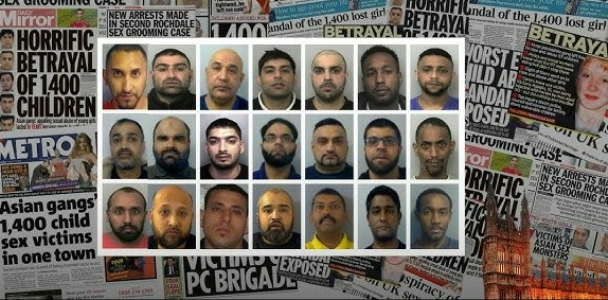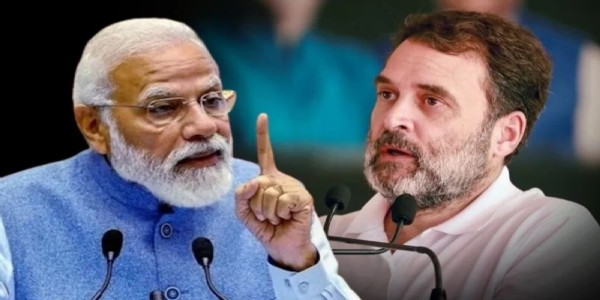Terrorist linkages of illegal Rohingya immigrants - Centre raises concerns of National Security at Delhi HC
Reports suggest that over and above the said serious security concerns already in existence, the more disturbing part is that there is an organized influx of illegal migrants from Myanmar through agents and touts facilitating illegal Rohingya migrants into India via Benapole - Haridaspur (West Bengal), Hilli (West Bengal) and Sonamora (Tripura), Kolkata and Guwahati.
Total Views | 184
In a recent incident, Indian govt shared its grave concern about increased Rohingya illegal immigrations and theri recorded aquantances with terrorist groups in Pakistan. According to a recent update, the Central Government has informed the Delhi High Court that there is contemporary data from security agencies' inputs and other authentic material indicating linkages of some of the unauthorized Rohingya migrants with Pakistan - based terror organizations and similar organizations operating in other countries.
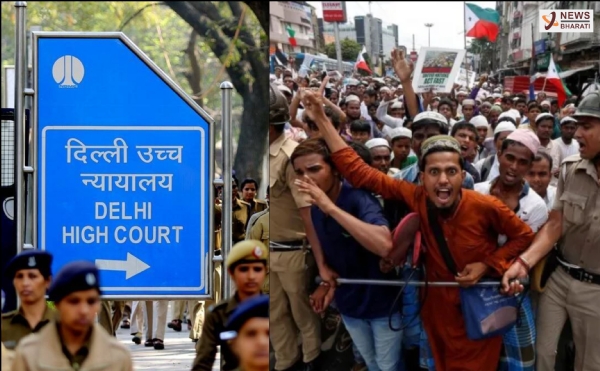
Reports suggest that over and above the said serious security concerns already in existence, the more disturbing part is that there is an organized influx of illegal migrants from Myanmar through agents and touts facilitating illegal Rohingya migrants into India via Benapole - Haridaspur (West Bengal), Hilli (West Bengal) and Sonamora (Tripura), Kolkata and Guwahati. This situation is seriously harming the country's national security, stated the affidavit filed by Central Government in the Delhi HC.
As per the affidavit, the illegal inflow of Rohingyas in significant numbers has started to the territory of India since 2012- 2013. It also submitted that due to an already existing large inflow of illegal immigrants from the neighboring countries, the demographic profile of some of the bordering states has already undergone a serious change which is already causing far-reaching complications in various contexts and is taking its toll and has a direct detrimental effect on the fundamental and basic human rights of country's own citizens.
It is further submitted that so far as India is concerned, national security considerations rank the highest on the country's list of priorities given a geopolitical influence in the region and its vulnerability to mass border infiltrations due to the porous nature of its border which our country shares with many countries, it stated.
Rohingya refugees have been categorized by the Indian government as ‘illegal migrants’ in India since August 2017, for a number of (geo)political reasons. As per the data until 2020, several thousand Rohingyas were living in Hyderabad and Jammu (exact numbers are disputed), around 1,500 lived in National Capital Delhi, with similar numbers in Haryana's Mewat. A smaller number was scattered in other regions of India, such as West Bengal.
At the same time when we look at the reports from 2019, we see sharp increase in their numbers. Some inputs indicated that around 40,000 Rohingyas are staying in India illegally and the Rohingyas are largely located in Jammu, Hyderabad, Haryana, Uttar Pradesh, Delhi-NCR, and Rajasthan. . Hindustan Times mentioned that there are around 14,000 Rohingya registered refugees in India out of which 7,000 are in Jammu. Whereas Saddam Hussain Pandow, in his paper titled 'Press Coverage of Rohingya Issue: A Content Analysis of Four Newspapers In Jammu And Kashmir', the author has cited a section of media also reporting that "Rohingya Muslims are part of a larger game plan to escalate hybrid warfare as of suspicion the have links with external and Pakistani terror groups."
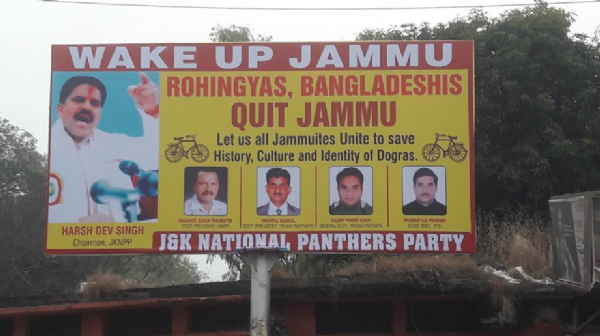
After the dispersal of Rohingyas from Myanmar into various parts of India, their unacceptable intrusions to the locals of several regions had triggered anti - Rohingya protests. Jammu and West Bengal were also experiencing anti-Rohingya protests, at times even defined as violent protests. Regarding their track of migration, reports state that depending on the available monetary resources, some Rohingya families spent years in Bangladesh; others passed through Bangladesh fairly quickly to get to India. Few came to India directly.
Also read: "More than 1500 youths of Assam joined militant organizations since 2016," informs CM Himanta Sarma
The affidavit of the Central govt regarding the illegal immigration of the Rohingya community and their links with Pakistan based terrorist groups, has been filed by the Foreigners Regional Registration Office (FRRO) in an ongoing matter where a petitioner (a Myanmarese woman) Senoara Begum and her three minor children challenging the Ministry of Home Affairs and FRRO's decision to refuse their exit permit applications to leave India for her resettlement in the United States.
In the matter, FRRO submitted that the Petitioner had committed a gross violation of Indian laws, visa rules and statutory conditions. The action taken by the Respondent officials was as per procedure and bonafide and the petition filed by the petitioner is devoid of any merits and is liable to be dismissed. FRRO further stated that the petitioner has not produced any document to show that she is a Myanmar national. That, not even a letter from the Embassy of Myanmar validating her nationality claim is available. It is submitted that till then her nationality is doubtful. That further her arrival in India is also not traced in immigration records.
However, the recent claim of Indian govt about the Rohingya linkages with Terrorist groups in Pakistan is not a first instance and neither is it an inclined affirmation. In the April 2016 issue of Dabiq, the mouthpiece of the self-proclaimed Islamic State (ISIS aka ISIL), a Bangladeshi jihadist Abu Ibrahim called on others to join him to help the oppressed Rohingya and support them in every possible way. He also warned that ISIL militants in Bangladesh would begin launching operations within Myanmar in time. In another publication that belongs to Al Qaeda in the Indian Subcontinent (AQIS) titled 'Al-Balagh' which is aimed at Bengali speakers, the publication referenced the Muslims in Myanmar and the Philippines and urged other Muslims to join their fight against oppression.
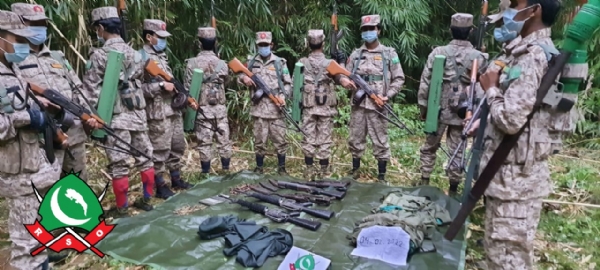
In a report published in RSIS Commentary, a Singapore based S Rajaratnam's School of International Studies' research journal (2016 publication) it is stated that, ever since the two jihadi militant groups mentioned the issue in their official publications, a fighting force of between 40 to 250 men had been organized. They planned the attacks on Myanmar border police over three months. They travelled by boat along a coastal route and were aided by “local Muslims” with unsubstantiated links to the Rohingya Solidarity Organization (RSO) at the time.
The Rohingya Solidarity Organisation (RSO) is a Rohingya insurgent group, as well as a political organization, founded in 1982. The group discontinued its armed rebellion in 1998. There is strong evidence indicating their reorganization in 2021 Myanmar coup. But there are claims that this may have happened even before 2021. In the same report of the RSIS Commentary, it is also stated that "On 9 October 2016, a Facebook page supposedly belonging to RSO posted on its Facebook page that it is “still alive” after it was accused of being responsible for the attacks, on the same day, against three border guard posts in Maungdaw Township."
The report further mentions that, "The attacks resulted in the deaths of nine policemen along with several of the attackers as well as the looting of “more than 50 guns and thousands of bullets. The RSO had been blamed by the Myanmar government for other attacks and was believed to be dormant for some time until what appears to be a revival message on the Facebook page."
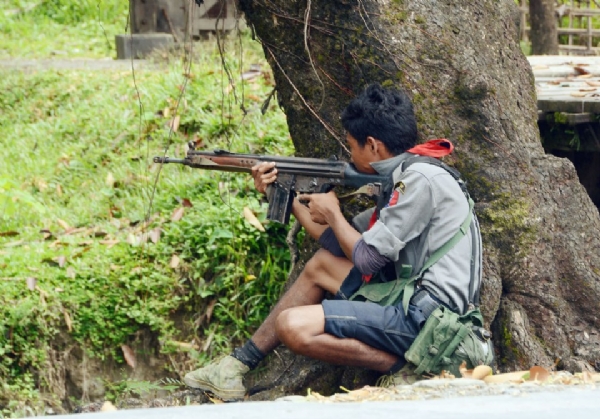
It further goes on mentioning that, "Two days later, on 11 October 2016, two videos surfaced on YouTube and were circulated in jihadist information circles. In the videos, what appeared to be militants were featured speaking in a mixture of Bengali, Arakanese and Arabic languages. According to these sources, the videos were recently taken by illegal immigrants from Bangladesh who managed to cross over to northern Arakan where the attacks on police posts on the border took place. Armed with AK-47 rifles, militants of unknown ethnicity stared into the camera, holding up their index finger in a pose identified with ISIL these days while the ISIL leader spoke to 'Rohingya brothers around the world'.
What came forth after the study of Jasminder Singh and Muhammad Haziq Jani (authors of the research paper) was that, "This reorganized group of militants, now identified as belonging to Harakah al-Yaqin, wants foreign-based Rohingya and jihadists to join them in northern Arakan to fight Myanmar forces who were looking for them at that moment. They requested medicine and for foreign-based Rohingya to relinquish their love for the world and their fear of death and to sacrifice their lives. They also asked for religious leaders to issue fatwa to legitimize their violence."
India's recent concern regarding the increasing numbers of illegal Rohingya immigrants, with a history of the community having linkages of active terrorism is a huge threat to national security. The State govts of states like West Bengal and Delhi as well, haven't addressed the issue with the required severity. It is now in the court of judiciary where some serious directions are expected on the matter considering the gravity of the subject.
Rashtriya Sewa Bharati
Mes, Pune





